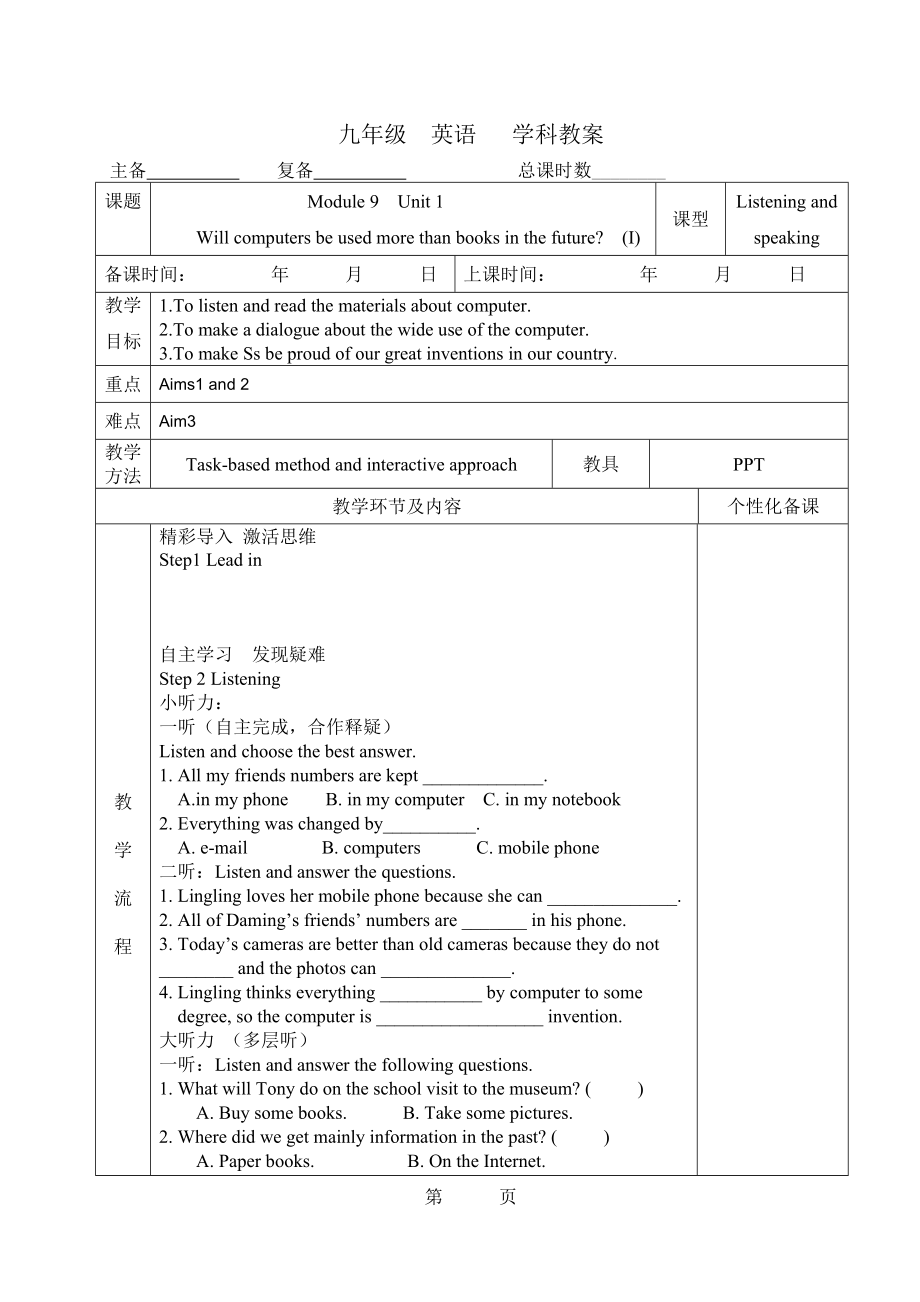《外研版九年級(jí)英語(yǔ)上冊(cè)Module 9 Great inventions Unit 1表格式教案》由會(huì)員分享����,可在線閱讀,更多相關(guān)《外研版九年級(jí)英語(yǔ)上冊(cè)Module 9 Great inventions Unit 1表格式教案(3頁(yè)珍藏版)》請(qǐng)?jiān)谘b配圖網(wǎng)上搜索����。
1、
九年級(jí)
英語(yǔ) 學(xué)科教案
主備 復(fù)備 總課時(shí)數(shù)________
課題
Module 9 Unit 1
Will computers be used more than books in the future? (I)
課型
Listening and speaking
備課時(shí)間: 年 月 日
上課時(shí)間: 年 月 日
教學(xué)
目標(biāo)
1.To listen and read the materials about com
2���、puter.
2.To make a dialogue about the wide use of the computer.
3.To make Ss be proud of our great inventions in our country.
重點(diǎn)
Aims1 and 2
難點(diǎn)
Aim3
教學(xué)方法
Task-based method and interactive approach
教具
PPT
教學(xué)環(huán)節(jié)及內(nèi)容
個(gè)性化備課
教
學(xué)
流
程
3、
教
學(xué)
流
程
教
學(xué)
流
程
精彩導(dǎo)入 激活思維
Step1 Lead in
自主學(xué)習(xí) 發(fā)現(xiàn)疑難
Step 2 Listening
小聽(tīng)力:
一聽(tīng)(自主完成�,合作釋疑)
Listen and choose the best answer.
1. All my friends numbers are kept _____________.
A.in my phone
4、 B. in my computer C. in my notebook
2. Everything was changed by__________.
A. e-mail B. computers C. mobile phone
二聽(tīng):Listen and answer the questions.
1. Lingling loves her mobile phone because she can ______________.
2. All of Daming’s friends’ numbers are _______ in his phone.
5�����、
3. Today’s cameras are better than old cameras because they do not ________ and the photos can ______________.
4. Lingling thinks everything ___________ by computer to some degree, so the computer is __________________ invention.
大聽(tīng)力 (多層聽(tīng))
一聽(tīng):Listen and answer the following questions.
1. What w
6�、ill Tony do on the school visit to the museum? ( )
A. Buy some books. B. Take some pictures.
2. Where did we get mainly information in the past? ( )
A. Paper books. B. On the Internet.
二聽(tīng):Listen and underline the wrong information then correct it.
Tony wants to borrow his
7、father’s camera and take some photos of the school dance and the basketball match. The photos will be shown in the school magazine. Tony’s dad lends the camera. He promises Tony to look after it.
合作探究 魅力精講
Step 3 Reading聽(tīng)后讀:
Find out the changes
1. How to keep in touch with friends?
In the pas
8�����、t:
We waited for weeks to hear from our pen friends abroad.
Today:
We can send and receive photos and mails on the Internet.
2 . How to get information?
In the past:
from paper books (thousands of pages)
Today:
on the Internet (powerful)
Step 4 Pair Work 讀后說(shuō)
1.Free talk:
What’s the adva
9����、ntage of an online magazine compared with an ordinary magazine?
cheap latest saving paper not lost read on the screen
2.Work in pairs. Talk about the advantages of these inventions.
email mobile phone TV washing machine
— We can use email to send messages.
— Yes, we can
10、 use email to send messages quickly and cheaply.
— We can use mobile phone to contact others.
— Yes, we can talk with anyone at any time.
— We can use TV to get a lot of information.
— Yes, we can use TV to know what is happening in other places.
— We can use washing machine to wash our c
11�����、lothes.
— Yes, we can easily make our clothes clean.
課堂總結(jié) 體會(huì)收獲
Step 5 Summary
1. Words and phrases
put up thousands of get information on the Internet
They’ll be put up on the school website.
Will computers be used more than books in the future?
2. Grammer
一般將來(lái)時(shí)的被動(dòng)語(yǔ)態(tài)
will be + p
12、p + (by…)
is/are going to be + pp + (by…)
當(dāng)堂達(dá)標(biāo) 反饋補(bǔ)救
Step 6 Practice
1. A Disneyland?Park?___?in?Shanghai?Pudong?New?Area?in?the?near?
future.?
A.?builds?? B.?has?built?? C.?will?build??? D.?will?be?built?
2. Don’t?put?off?today’s?work?for?tomorrow.?I?mean,?today’s?work?
____?today.?
13���、
A.?may?do???????B.?must?do??????C.?may?be?done?? D.?must?be?done
3.Trees?and?flowers?___every?year?to?make?our?country?more?beautiful.
A.?clean???? ???B.?cleans????? ?C.?are?cleaned? D. is cleaned
4. — Must we clean the classroom now?
— No, you needn’t. It ________ after school.
A.may clean B. must clean
C. need be cleaned D. can be cleaned
5.— Does she like singing English songs?
— Yes. She ___ to sing English songs in her room.
A. often hear B. is often heard C. often hear
Step 7 Homework
板書設(shè)計(jì)
教學(xué)反思
第 頁(yè)
 外研版九年級(jí)英語(yǔ)上冊(cè)Module 9 Great inventions Unit 1表格式教案
外研版九年級(jí)英語(yǔ)上冊(cè)Module 9 Great inventions Unit 1表格式教案

